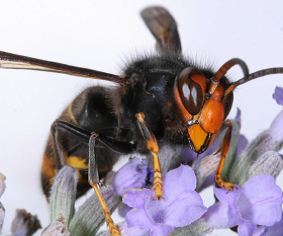

They may be only marginally over an inch long but they pack one hell of sting - and they are now here in Jersey.
The Asian Hornet, which is spreading throughout Europe, is an aggressive predator of native insects and poses a significant threat to honey bees, wasps and other pollinators.
The Asian Hornet, or to use its latin name Vespa Velutina, isn’t any more harmful to humans than native hornets, but they are moving north from France and the first confirmed one was found in the Island on August 9th at Mount Bingham.
John Pinel, Principal Ecologist at the Department of Environment, said the arrival of the first Asian Hornet should not turn into an invasion, as long as measures are taken to keep their numbers down.
He said: “There is a good chance the Asian Hornet won’t get out of control in Jersey, but we will have to take measures to ensure their numbers are kept to a minimum.
“The main problem is that they can attack honey bee hives and eat the bees. They also eat our native wasps, who do an incredible job keeping the number of other insects like flies and mosquitos down.
“There is nothing we can do about the odd Asian Hornet coming over from France, but we could really do without them developing a widespread population in Jersey as it would be bad news for the honey bee and wasp.
“We will be monitoring them closely and we will be putting traps out as well as destroying nests if, and when, they are found.
If you think you have seen an Asian Hornet, avoid disturbing any nest, but do send a photograph (if possible) and location information to j.pinel@gov.je or agriculturalInpsectors@gov.je, or telephone the Department of the Environment on 441600.
The Asian Hornet was first recorded in France in 2005, possibly through the port of Bordeaux and since then has spread rapidly throughout the French countryside.
Slightly smaller than the native European Hornet - Queens are around three centimetres in length - they have never been found on the UK mainland.
Mr Pinel said: “I think it is only a matter of time before they are found in the UK because they are moving north and there is really nothing to stop them.
“We are in a good position here in Jersey as we are a fairly small Island and as such any nests can be dealt with very quickly.”
Comments
Comments on this story express the views of the commentator only, not Bailiwick Publishing. We are unable to guarantee the accuracy of any of those comments.